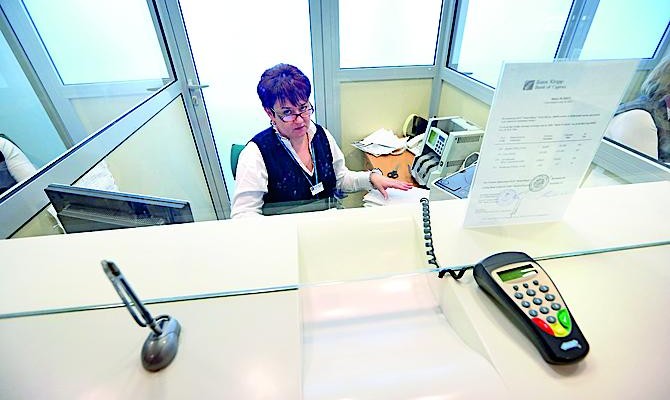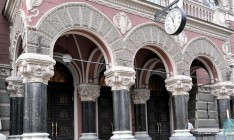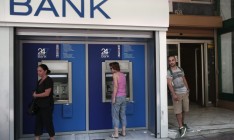Finance
StrategiesBanks profiting from commissions

Despite the financial crisis, Ukrainian commercial banks are earning more money on commissions every passing month. In September, their commission earnings peaked at UAH 2.6 bn, which is 17% higher than in August.
Service plan
“At the time of decline in the quality of servicing of loans and when the overall macroeconomic situation does not allow development of lending, banks try to maintain a positive financial result through other forms of activity. One of the least risky areas with an acceptable profit margin is providing alternative services that guarantee commission earnings,” says Head of the Financial Sector Ratings Department at IBI-Rating Anna Apostolova.
Payment and cash services are the main source of commission earnings and they are becoming more expensive. “Tariffs have been raised. Over the past six months almost all the banks have changed their tariff plans for many services. They revised the cost of cash management services and certain tariffs on card products,” says Advisor to the CEO of Eurobank Vasyl Nevmerzhytskiy.
Some banks have sharply increased commissions for using hryvnia payment cards abroad. In such a manner, they converted dollars not at the rate of UAH 13 set by the NBU, but at UAH 14. Furthermore, some players, in particular PrivatBank and Sberbank of Russia, sell currency only to their clients. Therefore, some people are forced to open unnecessary accounts for which they are also charged certain fees.
The commission earnings of those few financial institutions that did not raise their tariffs decreased. For example, the press service of UkrSotsBank reported that it did not raise its tariffs. The bank’s commission earnings in the Q3 2014 fell by nearly 8% compared with the same period last year.
The increasing number of payments with plastic cards played its role in the growth of commission earnings, says Deputy CEO and Head of Retail Business at UkrSibBank Kostyantyn Lezhnin. In January-September 2014, payments for goods with cards issued by banks-customers of the Ukrainian Processing Center for the first time exceeded the corresponding indicator of the withdrawal of cash from card accounts. Every time people pay with cards banks earn the so-called interchange commission, which is paid to them by retail chains.
The migration of clients from insolvent financial institutions contributed to the increase in commission earnings of certain banks. This fact was confirmed by UkrSibbank. “The number of our clients grew by 50%,” says Lezhnin. Ukrainians open accounts in financial institutions that are new to them and for this reason commission earnings grow, believes Nevmerzhytskiy.
Earnings from interest are also often viewed as commission earnings. Bankers often tack on all sorts of commissions when issuing loans. Sometimes they do not charge a one-time fee, but instead set monthly commissions based on the amount of granted loans. Therefore, early repayment of such loans in installments is economically meaningless and in general it leads to a rise in the cost of a loan. Such consumer loans are offered to the customers of Alfa-Bank. In the Q3 2014 this financial institution became a leader among the largest banks in terms of the increase in commission earnings. Compared to July-September 2013, Alfa-Bank registered an increase of this indicator by 64%. The commission earnings of Finance and Credit Bank and Russia’s Prominvestbank also increased by more than 50%.
Irregular deviation
Financial institutions are forced to increase commission earnings because the line-item of their income – namely, interest rates – leaves much to be desired. In September the banks earned only UAH 11.5 bn from interest rates. This amount was slightly lower in June. Interest rates on loan did not decrease in September. Hence, the main reason for the fall in interest income is non-payment of interest on loans. A number of companies suffered due to the hostilities in the eastern part of the country and some had to shut down and go out of business. This means they cannot repay their bank loans on time. In September, industrial production in the Donetsk and Luhansk oblasts collapsed by 60% and 85%, respectively, and all over the country – by 17%.
The situation with loans for individuals who lost their sources of income is not any brighter. “The problem is particularly acute in unsecured consumer portfolios. Devaluation of the hryvnia and reduction of its purchasing power combined with lower wages in some sectors put many people between ‘a rock and a hard place’: either pay back the loan or provide the family with bare essentials,” said Nevmerzhytskiy. Even those few that have the money to pay back their debts cannot do so because the banking system is not operating in the ATO zone.
As a result, the size of overdue payments is growing. As of October 1, according to the NBU, they have reached 11.5%, while at the beginning of the year this figure was 7.7%. At the same time, the NBU data is far too optimistic. In fact, today every second bank customer withholds loan payments. “The situation is exacerbated by a sharp narrowing of the range of solvent potential customers, which limits the ability to expand lending activities,” says Apostolova. In this case, banks will continue to try to diversify their sources of earnings. Therefore, in future the proportion of commission earnings in the total income of the banking system will grow.






 of the agreement of syndication with Financial Times Limited are strictly prohibited. Use of materials which refers to France-Presse, Reuters, Interfax-Ukraine, Ukrainian News, UNIAN agencies is strictly prohibited. Materials marked
of the agreement of syndication with Financial Times Limited are strictly prohibited. Use of materials which refers to France-Presse, Reuters, Interfax-Ukraine, Ukrainian News, UNIAN agencies is strictly prohibited. Materials marked  are published as advertisements.
are published as advertisements.